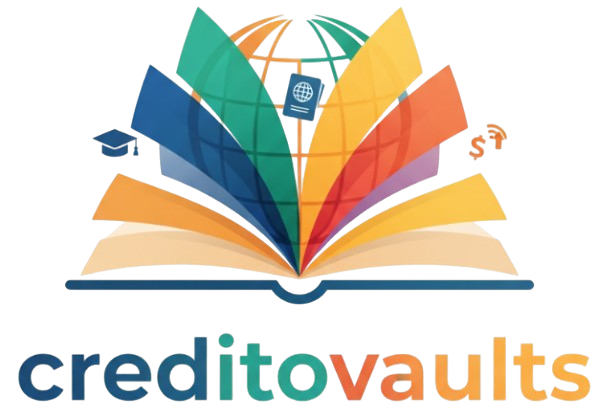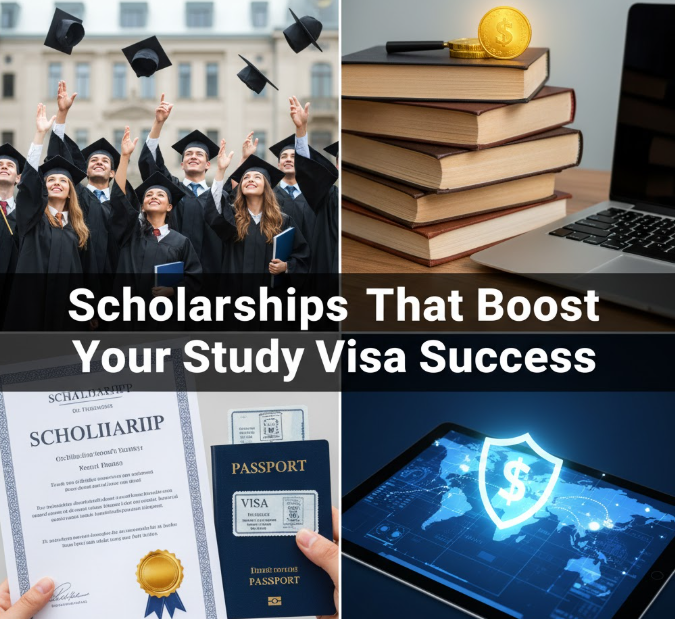Have you ever wondered why education plays such a big role in immigration? When you apply for a visa, especially for countries like Canada, Australia, the UK, or Germany, your education isn’t just a line on paper — it can be a powerful key that opens doors to new opportunities abroad.
Let’s talk about how your education can actually shape your immigration journey — from improving your eligibility to increasing your chances of permanent residence. This article will walk you through everything in a simple, human way — no complex jargon, just clear, useful information you can apply right away.
Education as the Foundation of Immigration Success
Education doesn’t just help you get a job; it helps you qualify for a visa in the first place. Most developed countries have immigration systems that reward people with higher education levels. The logic is simple — skilled and educated migrants contribute more to the economy.
For example, if you have a Bachelor’s or Master’s degree, you’re more likely to get higher immigration points in systems like:
-
Canada’s Express Entry
-
Australia’s SkillSelect
-
New Zealand’s Skilled Migrant Category
These systems literally assign points to your education level. The higher your qualification, the more points you earn — and the stronger your overall application becomes.
Why Governments Prefer Educated Immigrants
Think about it from their perspective. When a country welcomes someone with higher education, they’re not just inviting a traveler; they’re adding a long-term asset to their workforce.
Educated immigrants are:
✅ Easier to train
✅ Faster to adapt to the economy
✅ More likely to start businesses
✅ Better at integrating into society
For this reason, immigration programs often use education as a filter to identify skilled individuals who can quickly contribute to their new home country.
Here’s a quick look at how education affects your profile under some popular visa systems:
| Country | Immigration System | Education Importance | Points Example |
|---|---|---|---|
| Canada | Express Entry | Very High | Master’s Degree = up to 135 points |
| Australia | SkillSelect | High | Bachelor’s = 15 points; PhD = 20 points |
| UK | Skilled Worker Visa | Moderate | Must meet job + education standards |
| Germany | EU Blue Card | High | Requires a recognized degree |
| USA | Employment-Based Visa (EB-2, EB-3) | Very High | Advanced degrees favored |
The Hidden Advantage of Having an International Degree
If you already studied abroad, that’s a golden advantage. Many countries favor international graduates because they’ve already adapted to local culture, language, and education systems.
For instance, if you completed your studies in Canada or Australia, you can often transition from a student visa to permanent residency more easily. The reason is simple — you’ve already shown commitment, integrated into their education system, and are likely to find work faster.
This pathway is commonly called the “Study-to-PR Route”, and it’s one of the easiest legal immigration routes available today.
Education Helps You Meet Job Requirements
Many immigration streams are employment-based, meaning you need a job offer or a skill set that matches demand. Without the right educational background, you might not even qualify for those occupations.
For example:
-
Want to work as an engineer in Canada? You’ll need at least a Bachelor’s degree in Engineering.
-
Want to become a nurse in the UK? You must have a nursing degree plus registration.
-
Aiming to teach in Australia? You need a valid teaching qualification recognized by Australian authorities.
So, education acts like your passport to job eligibility. Even before the visa process begins, your degree helps you get shortlisted for jobs that meet immigration requirements.
Education Can Boost Your CRS or Skill Points
If you’ve looked into immigration programs like Express Entry (Canada) or SkillSelect (Australia), you’ve probably seen something called a points-based system.
Your points depend on factors like:
-
Age
-
Language ability
-
Work experience
-
Education
Here’s how education plays into that:
| Education Level | Approximate Points (Canada) | Approximate Points (Australia) |
|---|---|---|
| High School | 30 | 0 |
| Bachelor’s | 120 | 15 |
| Master’s | 135 | 20 |
| PhD | 150 | 25 |
As you can see, even a one-degree difference can mean the difference between rejection and approval.
Language + Education = A Perfect Combo ️
Education also improves your language test scores, indirectly helping your visa application. People with higher education levels generally score better in IELTS, TOEFL, or PTE — which most immigration systems require.
Imagine two applicants:
-
Applicant A: Bachelor’s degree + IELTS Band 7
-
Applicant B: Master’s degree + IELTS Band 8
Both are skilled, but Applicant B gets more total points and is more attractive to immigration officers.
So, even if your education doesn’t directly give you a job, it can amplify other areas of your profile — like language, adaptability, and employability.
Education Opens Study-to-Work Pathways ➡️
If you’re still studying, your education can become your first step toward a long-term immigration plan. Many students start on a study visa and then switch to a work or permanent visa after graduation.
Here’s how it typically works:
| Step | Description |
|---|---|
| 1️⃣ | Apply for a student visa in your desired country. |
| 2️⃣ | Complete your studies (Bachelor’s/Master’s). |
| 3️⃣ | Get a post-graduation work permit (usually 1–3 years). |
| 4️⃣ | Gain local work experience. |
| 5️⃣ | Apply for permanent residency. |
Countries like Canada, Australia, and New Zealand encourage this route because it attracts young, educated, and skilled workers who already understand the local system.
Recognition of Your Educational Credentials
A big factor that many people overlook is credential evaluation. Not all degrees are automatically recognized abroad. Before you apply for immigration, your education may need to be verified through an authorized body.
For example:
-
Canada requires an ECA (Educational Credential Assessment) through WES, IQAS, or CES.
-
Australia uses skills assessment bodies like Engineers Australia or ACS.
-
USA uses NACES-approved evaluators.
This step ensures your degree is considered equivalent to local education standards. Without it, even a Master’s degree might not help you in your immigration application.
The Role of Education in Career-Based Immigration Visas
Let’s say you want to move abroad as a skilled worker — in most cases, your educational qualification defines your career category.
For instance:
-
Software Engineers → Need a degree in Computer Science
-
Civil Engineers → Need an Engineering degree
-
Accountants → Must have Accounting or Finance degrees
-
Healthcare Workers → Need relevant medical degrees
Education isn’t just a document — it’s your entry ticket into the skilled migration list.
Education and Settlement Opportunities
Once you immigrate, your education also plays a major role in settling down successfully. Educated immigrants often find jobs faster, earn better salaries, and adapt more quickly to new environments.
Research shows that migrants with university-level education are:
-
60% more likely to secure employment within 6 months
-
40% more likely to earn higher income
-
Twice as likely to start their own business
So, your degree doesn’t just help you get the visa — it helps you thrive once you’re there.
Real-Life Example
Consider two applicants to Canada:
| Applicant | Qualification | Work Experience | CRS Points (approx) | Result |
|---|---|---|---|---|
| Ali | Bachelor’s Degree | 3 years | 435 | Not invited |
| Sara | Master’s Degree | 3 years | 475 | Invited to apply for PR |
Both are skilled and experienced, but Sara’s higher education gave her the extra points she needed to receive an invitation. This simple difference changed her entire immigration outcome.
Education Can Offset Other Weak Points
What if you’re older, have fewer years of work experience, or only average language scores?
Education can balance your profile.
A higher qualification can offset weaker points in age or work experience. Immigration systems are designed to look at your total potential, not just one factor.
For example, if you’re over 35, a Master’s or PhD can help you stay competitive against younger applicants.

Education Also Affects Dependent Visas
If you’re applying with your family, your education can help your spouse or dependents too.
For example:
-
Your higher qualification increases your family’s overall eligibility.
-
It may qualify your partner for open work permits.
-
Children get better schooling opportunities under family visas.
So, education doesn’t only benefit you — it benefits your entire family’s immigration journey. ❤️
How to Use Education Strategically in Immigration Planning
Here are a few smart ways to use your education to your advantage:
✅ Upgrade your qualification before applying. Even a short postgraduate diploma can raise your points.
✅ Choose fields in demand (like IT, healthcare, or engineering).
✅ Get credential evaluations early to avoid delays.
✅ Improve your language scores — education and English tests work together.
✅ Apply for post-study work permits if studying abroad.
These small steps can make a huge difference in your immigration outcome.
Common Myths About Education and Immigration
Let’s clear up a few misconceptions:
❌ “Only a PhD guarantees immigration.”
➡️ Not true. Many successful immigrants only have Bachelor’s degrees — it’s about your overall profile.
❌ “Foreign degrees are always recognized.”
➡️ Not always! You need an ECA or skills assessment.
❌ “You can’t immigrate without education.”
➡️ Some work visas focus more on experience or trade skills — like welders, plumbers, or truck drivers.
So, while education helps a lot, it’s not the only thing that matters.
For more insights, check out Best Countries for Easy Immigration in 2025
FAQs About Education and Immigration
Q1: Does education guarantee immigration success?
No, it doesn’t guarantee it — but it significantly increases your chances. It’s one of the top scoring factors in most immigration systems.
Q2: Can I apply for immigration without a degree?
Yes, but options are limited. Some trade-based or employer-sponsored visas accept skilled workers with experience instead of formal education.
Q3: Does studying abroad improve my PR chances?
Absolutely! Many countries give extra points or easier pathways to students who completed local studies.
Q4: Should I get my degree evaluated before applying?
Yes. Always get your Educational Credential Assessment (ECA) done before submitting your immigration profile.
Q5: What’s better — education or experience?
Both are important. However, if you have to choose one to upgrade first, education often brings long-term advantages and higher points.
Final Thoughts ✨
Your education is much more than a certificate — it’s the foundation of your global journey. It tells immigration officers that you’re serious, skilled, and ready to contribute. Whether it’s through points, job eligibility, or study-to-work transitions, education silently shapes every part of your immigration story.
So, if you’re planning to move abroad, invest in your education first. It’s not just about passing exams — it’s about opening new borders, new opportunities, and a whole new life waiting for you.




